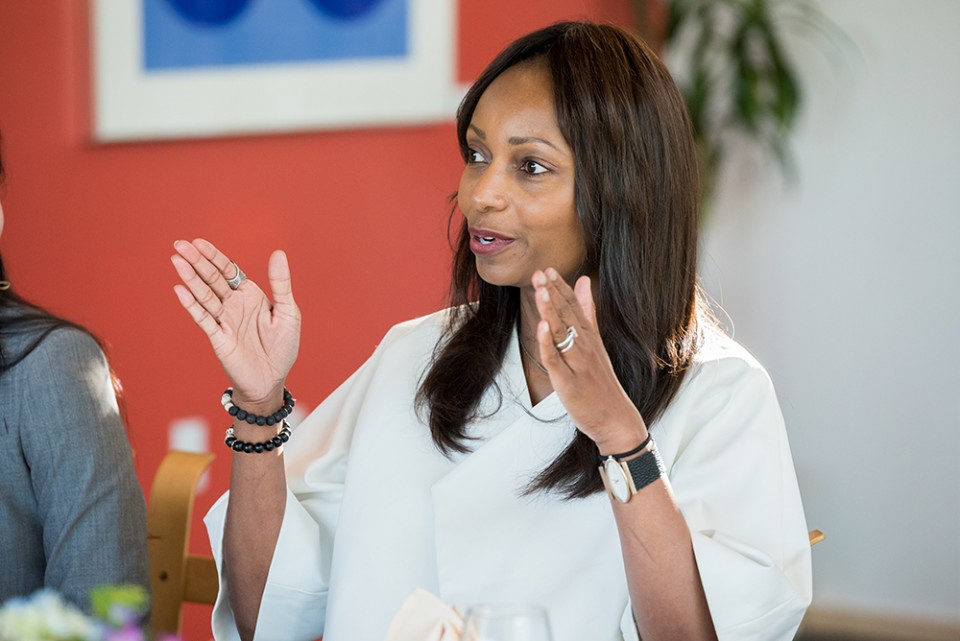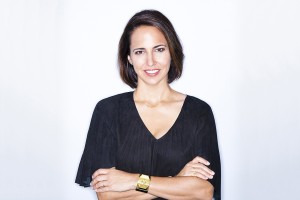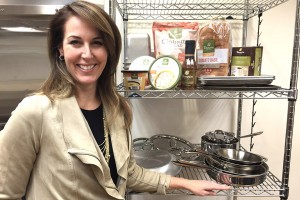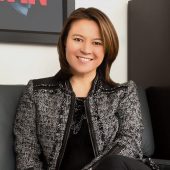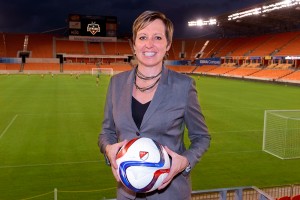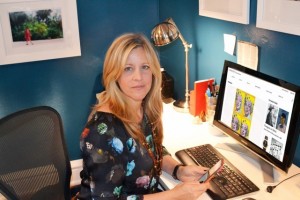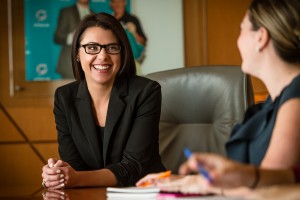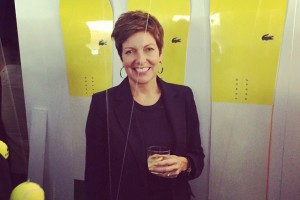Latondra Newton, Toyota’s Chief Social Innovation Officer, World Traveler, and L.A. Resident (part-time!)
It’s a great achievement to shy away from office politics to promote transparency within corporate America — while still attaining a very high level of success. And Latondra Newton, Toyota’s Chief Social Innovation Officer, has definitely done that: in addition to her primary role, she is also the Chief Program Officer for Toyota’s Mobility Foundation. Her roles focus on the areas of social responsibility, community relations, inclusion, and philanthropy for the brand that is ranked #6 on the 2015 list of Fortune 500 companies, and is the world’s largest automotive manufacturing company.
Newton travels a great deal to Japan – so much, in fact, that she has another residence there, in addition to her primary one in L.A. She is also on the board of the St. Bernard Foundation, which helps people across the country recover from natural disasters, and to that end, recently attended the events commemorating the tenth anniversary of Hurricane Katrina. Another philanthropic function of hers: overseeing the Toyota USA Foundation, which supports STEM education in schools.
How does she find the stamina for all these duties? For one, she has a “kind husband” who often brings her breakfast; she also, as mentioned, believes in transparency in the workplace, which saves energy (as well as being more ethical); and she takes a wise, philosophical attitude towards the concept of bias, courtesy of her mother’s maxim (read below).
More emotional sustenance: she relies on the fact that she “absolutely loves being part of a big family” (she was raised with five siblings) — and again, turning to her mother’s spiritual savvy, makes time each evening to figure out something from the day that she could make better when the sun rises again tomorrow. Read more below about this enlightened, globetrotting corporate dynamo below.
Can you tell the readers a little bit about yourself?
I have many interests – cooking, photography, travel, dancing, music, and reading. I have dual residences, in the Los Angeles area and Tokyo, so I often say that my commute to work is a long one. I am one of six children, and absolutely love being part of a big family.
What does a day in your shoes typically look like?
I spend about thirty percent of my time in Japan or other parts of the world – but I generally try to spend my time on a few key things:
-
-
- Driving decision-making on key policy issues
- Developing and empowering my team
- Collaborating with other business units
- I use airplane time to catch up on business reading, review proposals, and catch up on sleep
-
Also, the last eighteen months for me at Toyota have been anything but typical. I have been involved in launching the Toyota Mobility Foundation in Tokyo while realigning my North American Social Innovation organization, in anticipation of our move to Toyota’s new North American headquarters in Plano, Texas.
What are the first three things you do when you wake up in the morning, and the last three things you do before you go to bed?
Because I work in multiple time zones, I cannot avoid checking emails first thing and last thing. I also spend a few minutes in the morning on what I call “gratitudes” – listing who and what I’m grateful for. I chat with my husband about the dreams we had overnight.
In the evening, I read and reflect on one thing I can do the next day to make things better than they are today. That’s a habit I picked up from my mother.
What is your breakfast of choice?
When I’m home, it’s whatever my husband makes me. He’s very kind to bring me breakfast most days! When I’m eating out, I love huevos rancheros. In fact, I try them wherever I go as part of my quest to find the best ones in the world.
What keeps you energized and motivated at work?
Any opportunity to set a vision and galvanize a group of talented people around a cause excites me. My team’s work is about harnessing the power of a diverse group of talented people – along with financial assets and business ingenuity – all to make measureable impact on our business and society, and all in support of the company’s vision of being a leader in the mobility space.
What is the favorite part of your job?
Creating business and societal value at the same time. It’s important to me to have impact beyond what can be captured on a spreadsheet, so I have the good fortune of meeting amazing people regularly in my line of work.
For example, I was recently in New Orleans to commemorate the tenth anniversary of Hurricane Katrina, alongside one of our nonprofit partners, the St. Bernard Project (SBP). SBP rebuilds homes for people after natural disasters. Toyota taught SBP to apply our renowned production system to their process, resulting in a nearly fifty percent reduction in the time it took them to rebuild a home.
That means displaced families, who are often victims of contractor fraud, poor insurance coverage or a government system that just doesn’t work for them, can return to their homes much more quickly. Spending time with the many volunteers who work on the home sites as well as the families who are so grateful for the support was quite moving.
What and who inspire you at work?
Perhaps because I don’t have children of my own, I am very inspired by working mothers. My youngest sister is the best role model I have seen in that regard: she has three happy, kind, smart and beautiful children who adore and respect her. She also has the respect of colleagues, and deals with work crises even-handedly.
Do you have a “power outfit” that you wear for a big meeting or important work event?
Because fashion is a hobby for me, I tend to push the envelope a bit at work. Quality is always the first criterion, but I like to play with construction, and bring my own interpretation to what’s on trend. There are many ways to look professional without resorting to the “executive woman’s uniform.”
What is your favorite leisure activity after a stressful work week?
Exercise, and creating new recipes to try out on my husband. The cooking is rare these days because of my travel schedule, but I love it when I have the time.
How does your culture/background influence your work?
I was raised to be sincere in everything, so I don’t take well to office politics. It’s amusing how some people spend time trying to figure out my true motives, when I am about as transparent as they come!
How many times have you changed your career direction?
I have been lucky to have multiple careers within the same company. After engineering school, I worked in purchasing, external affairs, and human resources, before moving into the corporate executive roles I have held more recently.
Favorite job you’ve ever had?
I love what I’m doing now, pulling together our company know-how in ways that help solve social problems, but I truly enjoyed things about all of the roles I’ve played. My work philosophy has always been about seeing far beyond the confines of my cubical, helping the company solve problems that clear paths to bigger things.
What has been your biggest obstacle in your career and how did you overcome it?
Being the “first” (female, African American) or the “youngest” or the “only.” Those situations sometimes elicit doubts from people. I have found that overcoming them is a matter of good performance and good sponsorship – for me, sponsors have been people who have not only advised me, but championed my efforts.
What are your most steadfast ‘don’ts’ rules regarding work and the workplace, and what are your most cherished ‘do’s’?
-
-
- Do always be as transparent about your intentions as you can.
- Don’t allow politics to drive behavior
-
What are the most important qualities of a good leader?
-
-
- Inspiring others
- Empowering people to contribute to a purpose
- Creating an environment where collaboration happens
- Holding people accountable for the work
-
What are the unforgettable traits of role models who have inspired you most?
Knowing how and when to use humor; having a balanced perspective on life in general; and being a lifelong learner.
How have mentors impacted your personal and professional development?
I prefer sponsors over mentors. I have had three who have really made a difference. Sponsors are fierce advocates for talent. Mentors typically limit their engagement to giving career guidance.
What are three questions you like to ask during an interview to know if the candidate (or job) is the right fit?
-
-
- “Talk about a complex problem you solved and how you did it.”
- “Describe a recent mistake you made and how you recovered.”
- “What questions do you have for me about the role?”
-
What advantages do you see as a woman in the workplace?
Women have a natural tendency to collaborate – which I believe is an increasingly important skill in a fast-moving, global enterprise. The ability to bring together a truly diverse group of people to drive new ideas and solutions is the key to innovation.
What advice would you give to women starting their careers?
I have found that my male counterparts have been much better at expecting things to happen at work (recognition, promotion, new opportunities), whereas women are more likely to focus on deserving things. I encourage young women to expect more.
What book would you recommend for women just starting their careers?
Almost any book on the Enneagram. It’s a great way to build emotional intelligence.
What is your favorite quote you try to live by?
My mother once told me, after a disappointing experience with racial bias, “You can either walk around dragging your bottom lip, or you can do something about it.” It was my first lesson in not being a victim, but striving to influence others for good.
TAGS: SharpSavvySignificant
 Interviewer Interview Prep
Interviewer Interview Prep Impactful Mentees
Impactful Mentees Benefits of a Mentor
Benefits of a Mentor Advice for First-Time Managers
Advice for First-Time Managers Overcoming the 18-month Itch
Overcoming the 18-month Itch Dressing for Your Style
Dressing for Your Style Interview Style Tips
Interview Style Tips Women's Stocking Stuffers
Women's Stocking Stuffers Gift the Busy Traveler
Gift the Busy Traveler Father’s Day Gift Guide
Father’s Day Gift Guide Airport Layover Activities
Airport Layover Activities Traveling & Eating Healthy
Traveling & Eating Healthy Travel Like a Boss Lady
Travel Like a Boss Lady The Dual California Life
The Dual California Life Gifts for Thanksgiving
Gifts for Thanksgiving Summer Reading List
Summer Reading List Top Leisurely Reads
Top Leisurely Reads New Year, New Books
New Year, New Books Life Lessons from a Sitcom
Life Lessons from a Sitcom Oprah, Amy or Amal?
Oprah, Amy or Amal?





